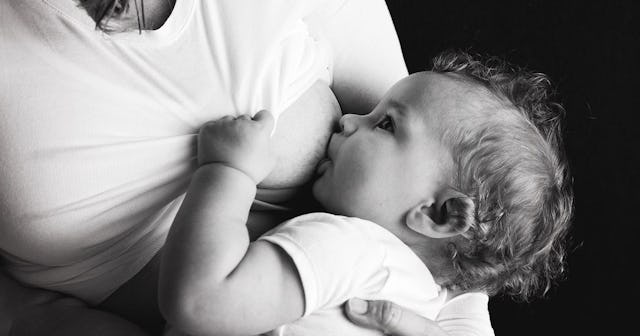Even Doctors Admit That Pressuring Moms To Breastfeed Does More Harm Than Good

Doctors are starting to understand that pressuring moms to breastfeed might not have the desired effect
If you had a baby in a hospital setting, chances are excellent that you ran into some messaging from medical professionals about the importance of breastfeeding. Whether it was benign (nurses not providing formula right away, only if it’s requested) or overt (“baby-friendly” hospitals where formula requires a doctor’s order) many moms in recent years have experienced an anxiety-inducing pressure to nurse their baby. And now, healthcare professionals are beginning to realize what scores of moms already know — pressuring women to breastfeed their children could cause more harm than good.
New information from the journal Nursing for Women’s Health urges more research into what the pressures to breastfeed does to a new mom. There’s a lot more to breastfeeding than simply assuming all moms should try it because it’s “natural.” Ana Diez-Sampedro, an author of the article and a clinical associate professor at the Florida International University Nicole Wertheim College of Nursing & Health Sciences thinks we need to dig a little deeper.
“We need more research on what happens to a person who wants to breastfeed and who can’t. What do they feel? Is this a risk factor for postpartum depression?” she says. “We think that for mothers, breastfeeding is the best option,” Diez-Sampedro says. “But that’s not the case for some mothers.”
Maria Olenick, chair of undergraduate nursing at FIU and the article’s co-author, cited her very different experiences in regard to pressures to breastfeed when she gave birth to her children 20 years apart — the younger in 2011. “Personally I noticed a tremendous difference in the way they approach it with women,” Olenick said. “When I had my first daughter, it was more or less just a question ― which would you prefer? With my second child, who was born in 2011, it was really clear what they preferred.”
Dr. Alison Stuebe, a maternal-fetal medicine physician and medical director of lactation services at University of North Carolina Health Care, tells HuffPost about findings on the link between breastfeeding issues and depression and anxiety in a new mom. “Women who breastfeed for shorter periods of time tend to have more depression, but whether the depression causes the weaning or the weaning contributes to the depression ― or something causes both ― is really hard to disentangle,” she explains.
However, it’s becoming clear that the way healthcare professionals talk to moms matters. “I think this is part of a bigger problem, which is the way that we communicate with mothers about their health and well-being,” Stuebe explains. “We have a tendency to talk in terms of ‘should’ and ‘must’ and telling women what to do, instead of saying, ‘This is complicated, and there are tradeoffs every minute of every day in parenting.’”
“To bludgeon people and say, ‘This is the right thing to do, and you must do this,’” she says, “does not solve the problem.”
Can we get an amen?
After an incredibly traumatic c-section and subsequent ovarian surgery for which I was put under anesthesia, I was feeling all kinds of inadequate as a new mother. I missed my child’s first six hours of life because I was asleep and then in recovery. I immediately worried about our ability to bond and since she was three weeks early and very sleepy, nursing was a struggle from the start. I began to pump exclusively when she wasn’t figuring out how to latch, and the amount of time I spent attached to the pump combined with my sadness that I was missing out on all that magical breastfeeding bonding that had been promised by countless books and my own OBGYN caused me to doubt my abilities as a mom. I dealt with pretty serious postpartum depression and anxiety throughout most of her first year and looking back, my terrible experience with breastfeeding and total lack of support or concern from anyone for my mental health was at the center of it.
Basically, what I could’ve used instead of my daughter’s pediatrician, the hospital’s lactation consultant, and my OB insisting I not give up on breastfeeding was someone taking my own health and well-being into account.
“It is not possible for health care providers to be aware of all the factors that play a role in forming a woman’s infant feeding intentions,” the authors of the article write, “but so long as a woman is provided appropriate education to make informed decisions, clinicians must trust that a woman will choose to do what is best, even if the woman’s definition of best is different than that of the health care provider.”
In other words, it would’ve gone a long way toward helping me if I had simply been given all the info and none of the insistence that I was going to fail my child if I turned to formula instead of nursing.
Breast may be “best” clinically, but what’s “best” overall for a new mom, her infant, and her family may mean some (or all) formula. At the end of the day, a lot goes into the care and keeping of a baby, and a happy mom who isn’t feeling pressure from all sides to do something “natural” that may feel anything but is an excellent start.
This article was originally published on